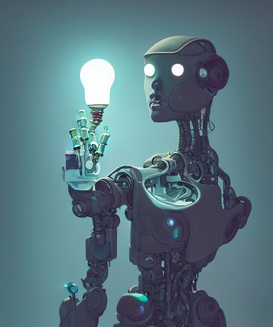This article projects industries that are poised to flourish as well as those that may experience job losses due to AI, highlighting high-growth job titles and those facing potential decline. By decoding the future workforce, we aim to empower individuals with the knowledge needed to adapt and thrive in an AI-driven world.
Industries likely to increase employment due to AI and large language models:
- Healthcare and Biotechnology: Personalized medicine, telemedicine, drug discovery, and diagnostics
- Renewable Energy and Smart Grids: AI-driven energy management, grid optimization, and advanced materials
- Cybersecurity: Adaptive security measures, threat prediction, and anomaly detection
- Data Science and Analytics: Advanced data analysis, visualization, and decision-making support
- Autonomous Vehicles and Transportation: Self-driving cars, smart traffic management systems, and vehicle maintenance
- EdTech: Personalized learning paths, immersive technologies for training/education, and content generation
- Robotics and Automation: Intelligent manufacturing processes, automated warehousing/logistics systems
- Smart Cities Infrastructure: IoT-based urban management systems (waste management, public safety)
- Entertainment Media & Gaming: AI-generated content (movies/music), virtual reality experiences/games
- Customer Support & Service Optimization: Chatbots for customer service/support tasks
Industries likely to lose jobs due to AI and large language models:
- Traditional Manufacturing: Assembly line workers replaced by automation/robotics technology
- Retail Trade (brick-and-mortar): Sales clerks replaced by e-commerce/chatbots/automated kiosks
- Administrative Support Services (repetitive tasks): Data entry clerks/accounting technicians outsourced/replaced by AI solutions
- Call Centers & Telemarketing Services: Reduced workforce due to chatbot/customer service automation
- Banking & Finance (routine tasks): Tellers replaced by ATMs/digital banking platforms; basic financial analysts replaced by robo-advisors
- Transportation & Warehousing (manual labor): Delivery drivers/manual laborers displaced by autonomous vehicles/drones/robots 7- Agriculture & Farming (low-skilled jobs): Fieldworkers replaced by agricultural drones/sensor-based technologies
- Hospitality/Tourism (entry-level jobs): Front desk clerks replaced by automated check-in systems; basic concierge services replaced by AI chatbots
- Print Media & Journalism: Traditional publishers/editors decline in demand due to AI-generated content/news
- Legal Services (repetitive tasks): Para-legal professionals losing job prospects due to advanced AI document processing
Top ten job titles with highest growth due to AI and large language models:
- Data Scientists & Machine Learning Engineers
- AI/ML Researchers
- Cybersecurity Analysts/Engineers
- Bioinformatics Specialists/Data Analysts
- Robotics Engineers/Mechatronics Engineer
- Artificial Intelligence Ethicists/Policy Advisors
- AR/VR Developers and Designers
- Autonomous Vehicle System Engineers
- Smart City Planners/IoT Specialists
- User Experience (UX) Designers for AI Applications
Top ten job titles with highest job loss due to AI and large language models:
- Assembly Line Workers (factory/manufacturing)
- Retail Salespersons/Cashiers
- Data Entry Clerks/Administrative Assistants
- Call Center Representatives/Telemarketers
- Bank Tellers/Routine Financial Analysts
- Drivers/Warehouse Workers (manual labor)
- Fieldworkers/Agricultural Laborers (low-skilled)
- Hotel Front Desk Clerks/Basic Concierges
- Newspaper Publishers/Journalists/Editiors(Print media)
- Paralegals/Legal Assistants


 RSS Feed
RSS Feed

